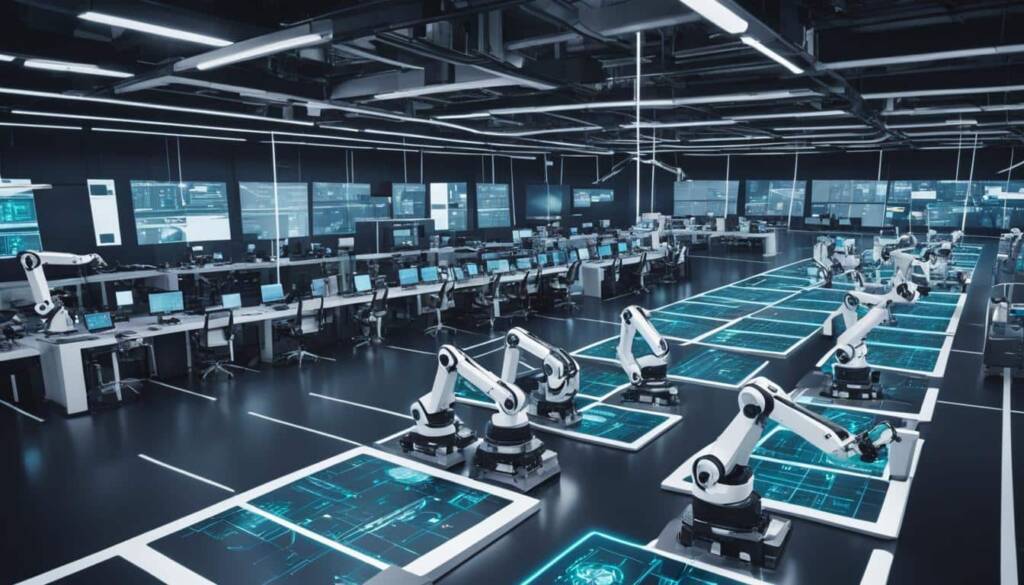Table of Contents
Smart manufacturing, also known as Industry 4.0, is transforming the manufacturing industry by integrating essential technologies. At the heart of smart manufacturing is the Internet of Things (IoT), connecting devices, machines, and sensors to enable real-time data collection and communication. Big data analytics is crucial for processing and analyzing the vast amount of data generated by IoT devices, allowing manufacturers to identify patterns and optimize production processes.
Artificial Intelligence (AI) and Machine Learning (ML) technologies play a vital role in predictive maintenance, process optimization, and automation. Robotics and automation solutions improve efficiency and productivity in manufacturing operations. Digital twins provide real-time simulations of processes for testing and optimization. Augmented Reality (AR) and Virtual Reality (VR) technologies enhance worker training and maintenance procedures. Cloud computing provides the infrastructure for data storage, analysis, and remote access to factory systems while ensuring robust cybersecurity measures are in place.
Smart manufacturing combines cutting-edge technologies to drive innovation, improve efficiency, and streamline processes in the manufacturing industry. In the next sections, we will delve deeper into the importance of quality control technology in smart manufacturing, explore the top smart manufacturing trends in 2024, and analyze the pros and cons of this transformative approach.
Quality Control Technology in Smart Manufacturing
Quality control technology plays a vital role in smart manufacturing, ensuring consistent product quality while reducing waste. By leveraging advanced sensors, machine vision systems, and quality data analytics, manufacturers can optimize their production processes and maintain high-quality standards throughout. Let’s explore the key components of quality control technology in smart manufacturing:
Sensors for Product Quality Monitoring
Advanced sensors, such as vision systems and electromagnetic sensors, are employed to monitor product quality at various stages of the production process. These sensors enable real-time data collection and analysis, allowing manufacturers to detect any quality deviations promptly.
Machine Vision Systems for Real-Time Inspections
Machine vision systems, powered by cameras and image processing algorithms, enable real-time inspections of products. By analyzing visual data, these systems can identify defects, measure dimensions, and ensure compliance with quality standards.
Quality Data Analytics for Process Optimization
Quality data analytics, empowered by artificial intelligence (AI) and machine learning (ML) algorithms, provide deeper insights into quality issues. By analyzing vast amounts of data, manufacturers can identify patterns, correlations, and root causes of quality deviations, enabling them to improve their production processes and reduce defects.
Statistical Process Control for Consistent Quality Levels
Statistical Process Control (SPC) techniques are employed to monitor and control manufacturing processes, ensuring consistent quality levels. By collecting and analyzing real-time data, manufacturers can detect process variations and take corrective actions to maintain quality standards.
Digital Traceability for Product Tracking
Digital traceability allows products to be tagged and tracked throughout the production and supply chain. This enables manufacturers to have complete visibility into their product journey, ensuring accountability, and facilitating any necessary recalls or quality investigations.
Real-Time Monitoring and Alerts
Real-time monitoring systems provide continuous visibility into production processes. In case of any quality deviations or anomalies, immediate alerts are generated, allowing manufacturers to take proactive measures and minimize quality issues.
Quality Control Automation for Streamlined Processes
Quality control automation enables sorting and categorization of products based on pre-defined quality criteria. This automation minimizes manual intervention, reduces human error, and increases overall process efficiency.
Predictive Quality Analytics for Anticipating Issues
By leveraging historical data and real-time process conditions, predictive quality analytics can forecast potential quality issues. This proactive approach enables manufacturers to take preventive actions and optimize their production processes to avoid quality deviations.
Quality control technology is indispensable for smart manufacturing, ensuring consistent quality, reducing waste, and optimizing production processes. By integrating advanced sensors, machine vision systems, quality data analytics, and automation, manufacturers can achieve higher levels of product quality and operational efficiency.
Top Smart Manufacturing Trends in 2024
In 2024, the smart manufacturing landscape is evolving, with several emerging trends that are revolutionizing the industry. These trends are driven by the increasing adoption of smart manufacturing technologies and the growing benefits they offer to manufacturers. Let’s explore the top smart manufacturing trends that are shaping the industry in 2024.
Predictive Maintenance
Predictive maintenance continues to be a key trend in smart manufacturing. By leveraging the power of AI, machine learning, and advanced analytics, manufacturers can proactively detect and address potential equipment issues before they result in unplanned downtime. Predictive maintenance helps optimize equipment performance, extends asset lifespan, and reduces maintenance costs.
Digital Twin Technology
Digital twin technology is gaining traction in the manufacturing sector. It involves creating a virtual replica, or “twin,” of physical assets, processes, or systems. This digital twin provides real-time insights into the performance and behavior of the physical counterpart. By simulating various scenarios and conducting virtual tests, manufacturers can optimize processes, improve efficiency, and reduce the time and cost of product development.
Advanced Analytics and AI
Advanced analytics and AI are driving business efficiency in smart manufacturing. By analyzing large volumes of data generated by sensors and production systems, manufacturers can gain valuable insights for process optimization, quality control, and decision-making. AI-powered algorithms enable real-time data analysis and predictive analytics, enabling manufacturers to make proactive and informed decisions.
Automation and Connectivity
Automation and connectivity are accelerating in smart manufacturing. Robotic automation technologies are being increasingly adopted to streamline production processes, increase productivity, and improve quality control. The Industrial Internet of Things (IIoT) enables seamless connectivity and data exchange between machines, systems, and components, facilitating real-time monitoring, predictive maintenance, and supply chain optimization.
Digital Solutions for Supply Chain Efficiency
Digital solutions are playing a vital role in enhancing supply chain efficiency. From inventory management and demand forecasting to real-time tracking and logistics optimization, manufacturers are leveraging digital technologies to optimize their supply chain operations. Real-time data and analytics provide insights for agile decision-making and enable manufacturers to respond quickly to changing market demands.
Workforce Strategies for Smart Manufacturing
As smart manufacturing technologies continue to advance, workforce strategies are evolving to meet the demands of the industry. Reskilling and upskilling initiatives help equip employees with the necessary skills to work alongside automated systems and emerging technologies. Emphasis is placed on fostering a culture of continuous learning, adaptability, and collaboration to ensure a seamless transition towards smart manufacturing.
As the smart manufacturing landscape continues to evolve, these trends will play a crucial role in shaping the future of the industry. Manufacturers who embrace these trends and leverage the power of smart manufacturing technologies will gain a competitive edge and drive innovation in the years to come.
Pros and Cons of Smart Manufacturing
Smart manufacturing brings a host of benefits to the manufacturing industry. Firstly, it enables increased efficiency in production processes. By integrating advanced technologies such as IoT, AI, and automation, manufacturers can streamline operations, optimize workflows, and reduce cycle times, resulting in higher productivity and output.
Another significant advantage is improved quality control. Smart manufacturing allows for real-time monitoring and analysis of production data, enabling manufacturers to detect and address quality issues promptly. This ensures consistent product quality, reduces waste, and enhances customer satisfaction.
Flexibility is also a key benefit of smart manufacturing. With the ability to adapt and reconfigure production systems quickly, manufacturers can respond to changing market demands and customer requirements more effectively. This flexibility allows for agile manufacturing, enabling businesses to stay competitive in dynamic markets.
Reducing environmental impact is another valuable advantage of smart manufacturing. By optimizing energy usage, reducing material waste, and implementing sustainable practices, manufacturers can minimize their carbon footprint and contribute to a greener, more sustainable future.
However, it’s important to acknowledge the challenges associated with smart manufacturing. The upfront investment required to implement advanced technologies can be significant, including the cost of acquiring and integrating IoT devices, AI systems, and automation technologies.
Additionally, the increased complexity of smart manufacturing systems can pose implementation and management challenges. Organizations must ensure they have the necessary expertise and resources to handle and maintain these intricate technologies effectively.
Cybersecurity risks are another consideration. As smart manufacturing relies heavily on interconnected systems and data, manufacturers face potential threats from cyber attacks. Robust cybersecurity measures must be put in place to safeguard sensitive information and protect against data breaches.
Organizational resistance to change can also hinder the adoption of smart manufacturing. Some employees may be resistant to learning new technologies or fear job displacement. Effective change management strategies and employee training programs can help address these concerns and drive successful implementation.
Lastly, a dependence on technology is inherent in smart manufacturing. Manufacturers must ensure reliable and uninterrupted access to technology infrastructure, as any disruption or failure could have a significant impact on operations.
In conclusion, smart manufacturing offers numerous advantages, including increased efficiency, quality control, flexibility, and reduced environmental impact. However, it is crucial for manufacturers to carefully consider the cons, such as high upfront investment, increased complexity, cybersecurity risks, organizational resistance, and dependence on technology, and determine how these factors align with their business goals and capabilities.
FAQ
What is smart manufacturing?
Smart manufacturing, also known as Industry 4.0, refers to the integration of cutting-edge technologies to revolutionize the manufacturing industry.
What are the essential technologies in smart manufacturing?
The essential technologies in smart manufacturing include IoT, big data analytics, AI, machine learning, robotics, automation, digital twin, AR, VR, and cloud computing.
How does quality control technology contribute to smart manufacturing?
Quality control technology plays a crucial role in ensuring consistent product quality and reducing waste in smart manufacturing.
What are some examples of quality control technology in smart manufacturing?
Examples of quality control technology in smart manufacturing include advanced sensors, machine vision systems, quality data analytics, statistical process control, digital traceability, real-time monitoring, quality control automation, and predictive quality analytics.
What are the top smart manufacturing trends in 2024?
The top smart manufacturing trends in 2024 include predictive maintenance, digital twin technology, AI, machine learning, advanced analytics, automation, connectivity, personalization, digital solutions, supply chain efficiency, and workforce strategies.
What are the benefits of smart manufacturing?
Smart manufacturing offers benefits such as increased efficiency, improved quality control, more flexibility, reduced environmental impact, lower costs, improved safety, and better decision-making through data-driven insights.
What are some challenges associated with smart manufacturing?
Challenges associated with smart manufacturing include high upfront investment, increased complexity in integrating advanced technologies, potential cyber security risks, resistance to change within organizations, and dependence on technology.












